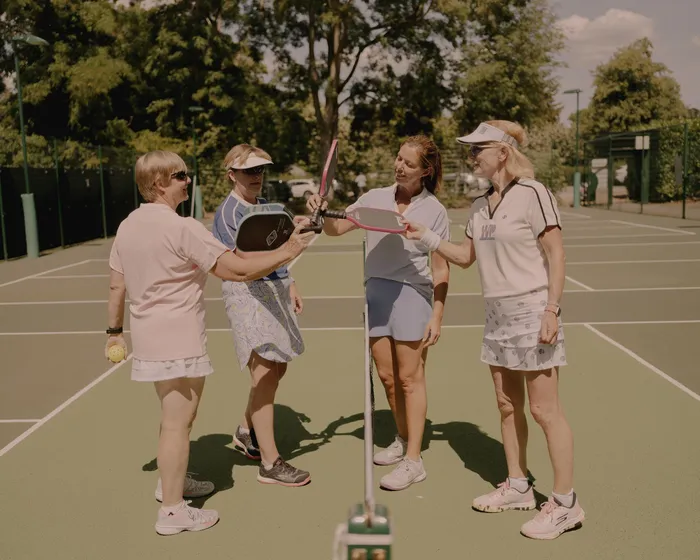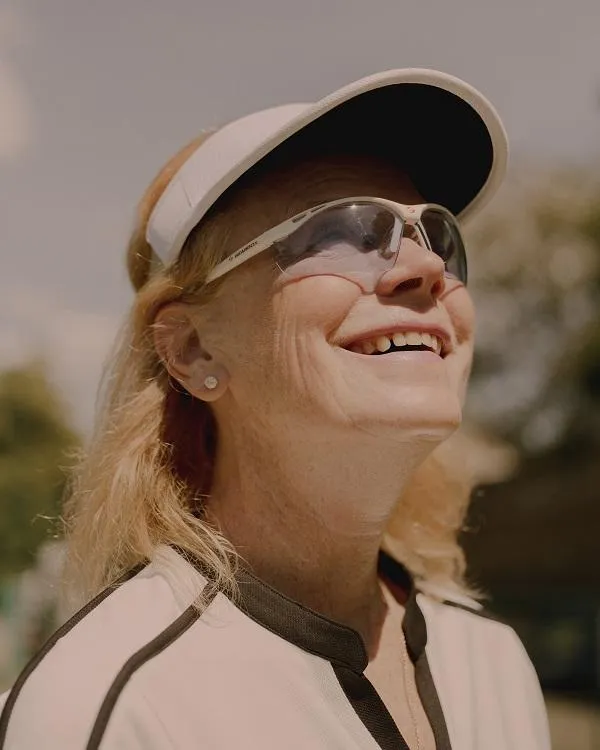Forget the tennis finals. At Wimbledon this July, it’s pickleball.

Wimbledon Pickleball players touch their paddles after a game.
Image: Tori Ferenc/ The Washington Post
Steve Hendrix
On Day 4 of Wimbledon, some of the fans who queued up outside the All England Lawn Tennis and Croquet Club to see Novak Djokovic take on Dan Evans might have heard a distinctive thwock thwock thwock coming from the public park next door. It wasn’t lawn tennis, or croquet, and it wasn’t there a year ago.
On Day 6, it was louder. More than 100 people showed up to try a new court sport as Emma Navarro and Barbora Krejcikova prepared to face off on Wimbledon’s Court No. 1, a few hundred yards away. Pickleball.
Here. Of all places. It took a while, but even at Wimbledon, Britain’s fortress of tennis traditionalism, pickleball is at the gates.
“It’s getting bigger all the time,” said Emma Wells, who runs tennis programs in Wimbledon Park. Wells introduced pickleball last year and is reconfiguring more of the courts each season. “You respond to demand, and the demand is definitely here.”
The upstart racket sport, which has upended court culture in the United States, Canada and Australia, is taking off across the United Kingdom. After being slowed by the coronavirus pandemic, membership in the country’s national pickleball organization grew by 73 percent last year and is on pace to jump by 114 percent in 2025.
The American-invented hybrid of tennis, ping pong and badminton was officially recognized as a sport in December by the top sporting councils in England, Scotland, Wales and Ireland, and is gaining footholds.

Carolyn Laville, who co-founded Wimbledon Pickleball.
Image: Tori Ferenc/For The Washington Post
More like foot faults, aghast tennis purists say. As it booms here, pickleball is bringing the same frictions with tennis players (jealous of court space, sniffy of the skill needed), and complaints from neighbors (annoyed at the noise) that has marked its explosive spread in the United States.
There was controversy at the highest levels - court intrigue, as it were - when the top governing body of English tennis in 2024 attempted unsuccessfully to wrest control of the new, suddenly everywhere sport from Pickleball England, the grassroots organization that has nurtured its growth since 2018.
Critics said the motives of the Lawn Tennis Association were as much to keep pickleball in its place as a “poor relation” as to promote it. The association denied being up to anything nefarious.
“We just felt that we could play a role by growing tennis and pickleball in a complementary way,” said Olly Scadgell, the association’s managing director of tennis development.
Perhaps nowhere is the juxtaposition of the ancient “sport of kings” and the newcomer recreation of the masses as acute as in Wimbledon, the leafy London suburb where tennis is a religion and the first fortnight of July are holy weeks.
At the venerable All England Club, the players wear white, the fans wear ties and, this weekend, the top pros will vie for trophies in the “Gentlemen’s” and “Ladies’” divisions. Asked about pickleball, many were not amused.
“My job is to maintain decorum and protocol,” said the honorary marshal dressed in a straw boater hat, a smart blue blazer and a flawless Windsor tie as he scanned the crowd around Centre Court last week.
“It would not be appropriate for me to say what I think of - ” the honorary marshal paused in apparent pain, “pickleball.” He declined to be quoted by name.
“It’s a fun game,” Dean Goldfine, an American coach waiting to watch Djokovic, said with a shrug. “I mean, you can’t compare it to tennis.”
“Could they please call it something else?” wondered Wimbledon resident Nina Ruiz, still in tennis whites from her morning game and watching a doubles match on a jumbo screen set up at nearby Roehampton Club, the site of some of Wimbledon’s practice courts. “I’ve played it, and I like it,” Ruiz said, “but that name.”
Roehampton is one of dozens of clubs where pickleball is breaking through, but with growing pains. Responding to requests, club management allows one of its indoor tennis courts to be taped over into four pickleball courts for one day each week. Pickleball players want more. Many tennis players don’t.
Paul Lindsay, who oversees the club’s nascent pickleball program, said the sport is gaining traction, but is still “stifled” by the trad-tennis resistance.
The club’s tennis committee is split between those who think pickleball should get more space and those who warn “it will devour tennis,” said committee member Emily Monson, who was also watching Wimbledon on the outdoor screen.
One possible solution: reconfigure a few tennis courts for pickleball each day between 1 and 5 p.m., when even retiree tennis players tend to retreat from the heat or, this being London, the rain.
“That’s a lot of retaping,” Ruiz said.
“It’s certainly treating them like second-class citizens,” Monson said.
Carolyn Laville grew up in Wimbledon, lives less than 500 yards from Centre Court and loves the grass-court pageantry that consumes her neighborhood each summer. She also wears her love of the new sport as loud as her pink-and-blue T-shirts that say “Wimbledon Pickleball,” the group she co-founded with her son, pro pickleball player Louis Laville.
The family discovered the game in Florida a few years ago and went crazy for it. Louis introduced the sport at Roehampton, played in national tournaments and helped start a nationwide Premier Pickleball League. He’s now playing the pro circuit in Australia.
Carolyn Laville, a business owner, plays at a growing number of courts around Wimbledon and recruits more and more players.
“Oh, well done!” she shouted, breathless, during a recent women’s drill at Roehampton after failing to reach a wicked crosscourt backhand.
Coming off the court, she unzipped her prized paddle, a JOOLA Agassi Pro signed by Andre Agassi. (Agassi is one Wimbledon vet who has embraced pickleball; as have Steffi Graf and Andy Roddick. John McEnroe has said “compared to tennis, I think pickleball does suck, honestly.”)
The keen new players are phlegmatic about the resistance from tennis die-hards.
“It’s a cultural thing,” said Serena Norgen, who says she joined the pickleball “cult” after retiring. “This club prides itself on being at the center of tennis. There’s a lot of anxiety about that. But pickleball is here to stay.”
It may be that no one ever orders a Pimm’s Cup or strawberries and cream at a pickleball grand slam. And demand is still nowhere near the tidal wave washing through U.S. parks and tennis clubs. By some estimates, almost 50 million Americans have tried the sport, which fans hail as more accessible than tennis, and scolds deride as akin to riding an e-bike in the Tour de France.
But popularity is building in the U.K. The number of venues climbed tenfold in the last six years, and the estimated number of players jumped from 2,000 to 45,000.
“A lot of clubs have embraced it, and a lot of them are now at full capacity,” said Karen Mitchell, a retired American Express executive who runs Pickleball England. “We’re always running out of space.”
Four dedicated pickleball courts debuted in June at Park Sports, a pay-to-play tennis complex on the grounds of Chiswick House, an 18th-Century neo-Palladian villa just across the Thames from Wimbledon. It was their second run at the sport; eight courts launched last year were popular but sparked noise complaints.
“We learned some things,” said Luke Brosse, the marketing manager for Park Sports. “With two tennis courts you have four players and two balls. With eight pickleball courts, you have 32 players and eight balls; it does make a bit more noise.”
The new courts, farther from nearby houses and showcased by the club entrance, have drawn double the bookings - “I’ve never seen a sport grow so fast,” Brosse said - and has inspired eye rolls from tennis-firsters.
“I think it’s a little silly compared to tennis, to be honest,” said Benjamin Borger, 19, a university student playing tennis at Chiswick last week. “My biggest issue is that it takes courts away.”
But Park Sports wants to expand pickleball. It is eyeing courts it manages in Hyde Park, Regent’s Park and other billboard London locales. But in those “Royal Parks,” owned by the Crown, pickleball has been a tougher sell.
“They have been a bit more hesitant about a new sport,” Brosse said.
Maybe, in the House of Windsor, pickleball has met its match.